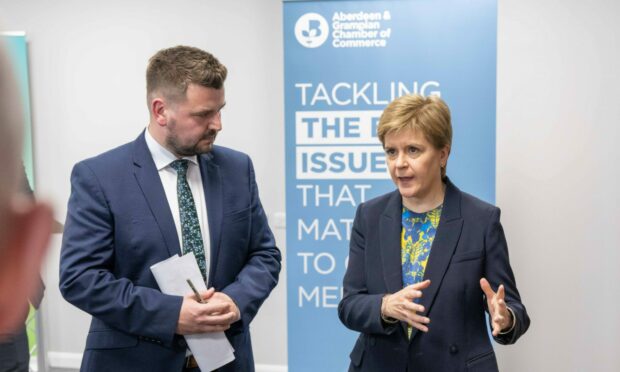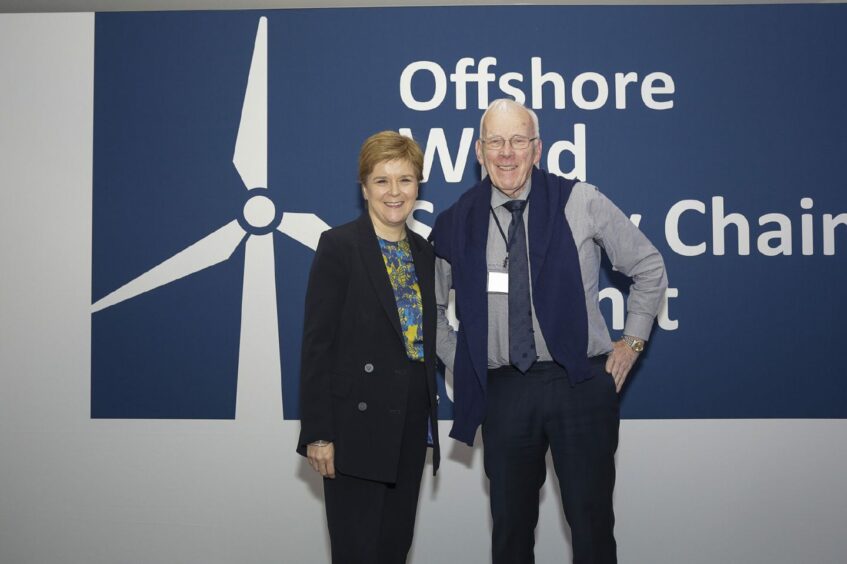Aberdeen would be “picking up the tab” for the cost of living crisis if energy companies are forced to pay more in so-called windfall taxes, a director of the chamber of commerce has said.
Ryan Crighton, the director of policy and marketing at Aberdeen and Grampian Chamber of Commerce (AGCC), said there was a “terrifying cocktail of challenges facing businesses right now” as First Minister Nicola Sturgeon spoke to local company owners and executives at the organisation’s offices in Bridge of Don.
He said her own senior SNP ministers had described the tax on UK oil and gas profits as “Scotland picking up the bill” for the current crisis, adding: “I’d go further and suggest Aberdeen is largely picking up the tab.”
For her turn, the First Minister admitted that “less attention up until now” had been spent on the effects on businesses struggling to meet energy costs, “although it is right there is equal focus on this” she said.
“We are at risk right now of a vicious downward cycle which is raising the real prospect of recession and growing unemployment,” she said, adding that government intervention similar to that seen during the pandemic should be on the cards: “Significant intervention is required at all levels of government to make sure we avert what will be a crisis – different in nature but on a scale similar to the pandemic that we have lived through over past couple of years.”
FM calls for windfall tax at prior meeting
But it was at her earlier meeting in Aberdeen that she said the UK Government should take action to protect consumers facing crippling energy bills and tax companies again.
Speaking a the ScotWind supply chain summit at the Marcliffe Hotel alongside businessman and former oil tycoon Sir Ian Wood, she said: “There should be another windfall tax on companies that are making windfall profits, whether that’s from the current global situation around energy or companies that have made windfall profits through different aspects of the Covid pandemic.”
Labour leader Sir Keir Starmer last week mooted an extension to the windfall tax, backdated to January, in order to help pay for a freeze on the energy price cap as average household bills are expected to soar to £4,300 by January.
The First Minister’s comments echo a similar sentiment from Scottish energy secretary Michael Matheson last week, who similarly stated that oil firms, and other sectors which enjoyed an economic boost from Covid, should face another levy to help abate the crisis.
Ms Sturgeon said: “Unless significant action is taken to try and avert this crisis, this is going to be worse than anything any of us have experienced in our lifetime.
“We are talking destitution for many people; people simply unable to meet the basic costs of living and lives will be lost from this crisis if action is not taken. That is how serious it is.”
At the same event, Sir Ian had a differing view on whether the levy should be extended.
“I think we’ve gone far enough on windfall tax. I think we absolutely must maximise the oil and gas opportunity, we must do it in a way that we minimise the damage to the environment, everyone is very well aware of that.”
Sir Ian said there is “no point” in the UK importing more fuel from overseas, and that message had been delivered clearly to Ms Sturgeon.
However, it is the case the decision on another levy lies with the UK Government.
Meanwhile, Crighton at the later event asked for the support of both Holyrood and Westminster as he made a plea against the proposed tax.
“Between VAT, fuel duties, and North Sea corporation tax, the Treasury has already banked £18.2 billion more in tax this year than it did in 2021.
“We know the opposition in Westminster wants to go back to the oil and gas sector again.
“But any extension of the windfall tax must not mean taking more from a North Sea already paying £22m per day in tax to the Treasury.”
He said the exchequer should look to other sectors such as big tech and the large supermarkets who “have also seen their profits swell, in some cases even more so than the energy companies”.
He said the levy would “simply borrow money from our energy transition” and “divert investment at the time we need it most”.
“We can’t allow that to happen. We need tens of billions of pounds to be invested in our energy transition if Scotland, and the UK, are to hit their carbon reduction targets.”




Conversation